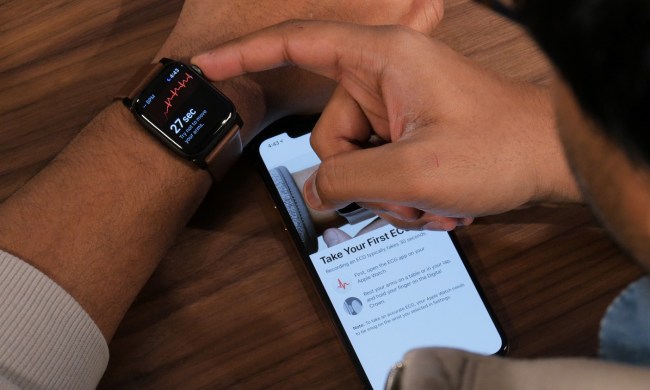
A few times a month, mixed martial artist Alexander or “Al” Iaquinta, takes a break from the gym and training, to sit down for a brain test.
He pulls on a thin elastic cap akin to the one used for swimming, except for a bunch of electrodes that stick out like alien antennae — and ringside physician Sherry Wulkan hooks him up to an amplifier. For the next 20 minutes, Iaquinta focuses on a computer screen, responding to various cognitive tasks, like pressing a button in response to a blue circle. Within 24 hours after the test, Wulkan receives a report of how well Iaquinta’s brain is functioning at the moment and whether he’s fit to train and fight or is due for a break.
Popping the hood on your brain
The computer that “reads” Iaquinta’s mind is an eVox, a brain-function assessment built by Evoke Neuroscience, and one of the latest feats in the mind-and-body-hacking marathon. Developed by neuroscientists James Thompson and David Hagedorn, eVox uses the concept of electrophysiology to peek inside the human brain. As neurons fire, they acquire and release electrical charges all the time. Consequently, our brains produce different types of electromagnetic waves, emitted at specific frequencies. These electrical events, or waves, can be detected through a set of electrodes attached to one’s head by an electroencephalogram or EEG. (Yes, it’s like The Matrix, only your brain-generated electricity is used to enhance your health rather than turn you into a battery.)
“Your brain is an electrical and chemical system and we’re recording the electrical component of the brain activity,” explains Hagedorn. “Brain waves are the visible recording of electrical impulses of the brain.” As part of its biofeedback readings, Evoke also uses electrocardiograms, or ECG, to measure the individuals’ hearth rhythms and assess their stress levels. “We look at both the brain and the heart,” Thompson says, “to see if one or both are not working well.”
Portable is useful
The idea of biofeedback isn’t new. In fact, EEGs and ECGs have been used in health assessments for decades. But until recently, biofeedback tests were cumbersome, complicated and could rarely be performed outside of hospitals or research centers. “It wasn’t something that a regular physician would do,” Hagedorn says.
“It’s very beneficial for me to know when to take time off, I need my best chances.”
Now, when you put the cap on, the sensors send the data to an amplifier, which pushes it to the cloud, where potent data-crunching algorithms check how your brains fair against the baseline values, stored in the database. “We took the standard tech and simplified the data analysis and interpretation procedures,” says Thompson. “Now Evoke is one laptop with one wireless amplifier and automated software.” Because the processing is cloud-based, the system has no bulky computers and fits into a little carry-on bag akin to the old-fashioned doctor cases.
The science behind the way you feel
That makes eVox easy to introduce to gyms, where athletes are often eager to jump back into the fray even when they haven’t fully recovered from a concussion or severe blow in the head. They may feel they’re back 100 percent, while in fact they’re still “fuzzy”— and Evoke can tell the difference. “We measure different parameters such as cognition, memory, and reaction time,” Wulkan explains. “We make athletes do certain tasks that are affected in a concussion.” The system is impossible to cheat, she says. If your brain is foggy and you react slow, it will show up on the readings no matter what you do.
Iaquinta felt that firsthand after he took a hard shot in the head. On the reading, his reaction times were indeed slower than on prior tests. “I was feeling a little fuzzy and was frustrated doing exercises that particular week, so I thought I was just having a bad day, but the program said I needed rest,” he recalls. Taking cognitive tests is changing the way he thinks of his physical wellbeing. “It’s very beneficial for me to know when to take time off,” he says. “I need my best chances.”
But the Evoke system is capable of more than a mere assessment. It also offers therapeutic functionalities like stress reduction. The software can assess stress levels by tapping into the autonomous nervous systems. For example, the sympathetic nervous system preps you for intense physical activity such as the fight-or-flight response, and the parasympathetic nervous system calms you down. If you’re constantly stressed, the test will show it, and eVox can train you to calm yourself down, like a personal mediating coach. “We can see whether your body systems are in a balanced state or not,” says Thompson. “And we can retrain the autonomous nervous system to function in a more normal pattern.”
So the brain readers are coming, and they sound like must-have gadgets we should keep next to thermometers in our medicine cabinets. That’s still probably years away, Thomson says. For now he’d like to get eVox into every physician’s office. “Checking your stress levels or whether your brain is aging normally should be as easy as slipping on a blood pressure cuff during your annual checkup,” he says. “That’s my dream.”






